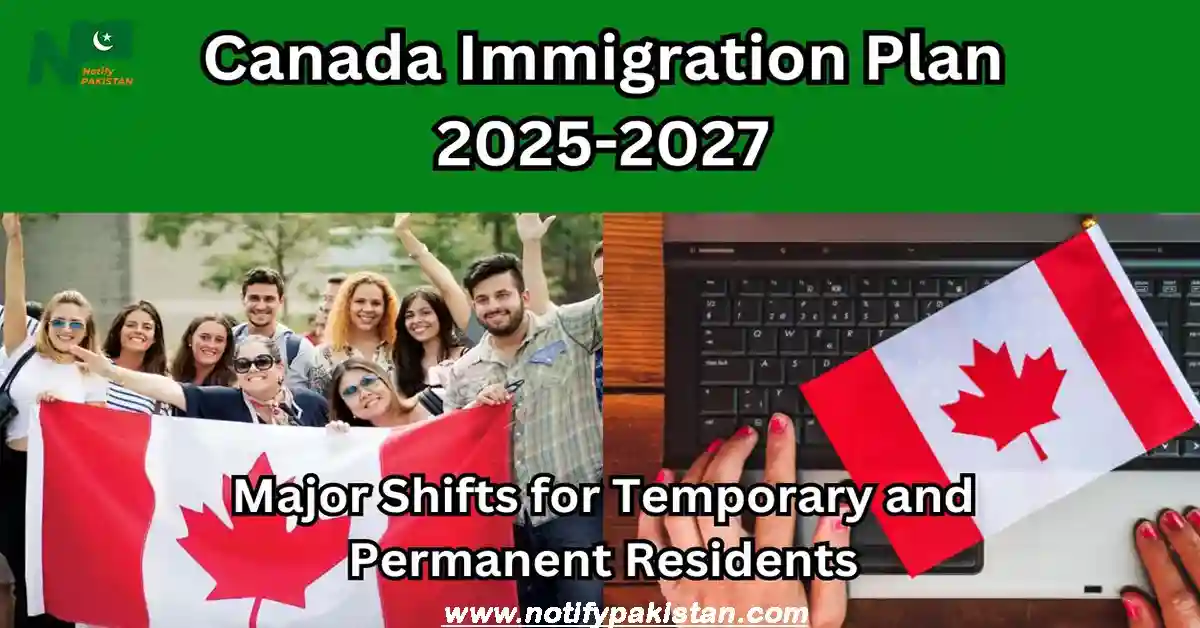Canada’s movement strategy will shift significantly between 2025 and 2027 as it addresses labor shortages and financial development. These modifications align with current legislation for both temporary and permanent residents highlighting Canada’s progressive approach to migration. These changes will affect a diverse spectrum of individuals, from professionals to students, as they are among the most tempting goals for workers globally.
Typically, the Arrange sets a target for admitting undocumented residents to Canada in the current year, followed by targets for the next two years and up to three years.
The deal affects more than simply Canada’s mobility destinations. The nation’s population expansion impacts social structures, taxation, housing, healthcare, and jobs.
How does the 2025–2027 Migration Plan look?
Immigration, Outcasts and Citizenship Canada (IRCC) will release its scheduled migration numbers for 2025–2027 to track the number of newcomers entering the nation. The plan for this year places further restrictions on temporary residents, such as those on study grants, job grants, and guest visas, while the prior plans mostly addressed permanent residents. Population growth, the expansion of work-advertising, housing, healthcare, and taxes are all going to be affected by the agreement.
To address concerns about overcapacity in some labor markets and social services, Mark Mill, the manager of Canada’s Migration Service, has stated that the country will restrict the number of temporary residents. Let’s look at what the big changes to the upcoming movement schedule mean for you.
Read Also: Leading Countries for Student Permanent Residency in 2024
Significant Changes to Canada’s Movement Plan (2025-2027):
Temporary Residents: Attention to Move-ins:
The migration plan for Canada will have a significant impact on temporary residents, such as visitors, experts, and students. In 2023, there were almost 2.5 million short inhabitants, accounting for 6.2% of the entire population. The IRCC plans to reduce this figure to 5% of the population by 2027.
Given that Canada proposes balancing short-term migration with long-term economic and social needs, this might be a big step. The goal for the next three years is to minimize the number of temporary residents, especially by decreasing open work permits and grants.
Consider Grants Carefully: Caps and Current Regulations:
Although study licenses have historically been a key source of temporary residents in Canada, the new system sets stricter requirements. In January 2024, the IRCC announced that it would prepare 35% fewer considered awards than in 2023, with a maximum of 360,000 approvals.
Notable changes:
- Limited Number of Considered Licences: In a departure from prior restrictions, the IRCC will audit a specific number of features of granting applications annually.
- Effects on Advanced Degrees: For the first time, experts and PhD students will be subject to a cap, resulting in 437,000 fewer approved grants in 2025.
What’s Changing?
The fact that universal understudy is joining programs that must change to meet Toada’s labor needs raises concerns, but these changes also represent Canada’s efforts to cut down on brie-short residents.
Grants for Open Work Stricter Guidelines for PGWPs and SOWPs:
Revisions are also being made to the Post-Graduation Work Allow (PGWP) and Spousal OpenWork Allow (SOWP) programs, which permit temporary workers to remain and work in Canada after being deemed specialists’ companions.
Post-Graduation Work Allowance, abbreviated PGWP:
- New Dialect Requirements: PGWP applicants will have to meet standards for proficiency in underutilized dialects beginning in 2025. While a Canadian Dialect Benchmark (CLB) score of 5 is required, a score of 7 is required for college graduates.
- Reduction in PGWP Grants: Due to the stricter requirements, the IRCC anticipates that 175,000 fewer PGWPs will be granted over the next three years.
Allowance for Spousal Open Work(SOWP):
Eligibility Restrictions: The SOWP will only be open to partners of professionals in essential fields such as healthcare and specialized enterprises. This adjustment will lower open work funds by 50,000 over the next three years.
What does this mean?
These changes indicate that if you are a friend of a temporary specialist or a universal understudy, you must make cautious efforts to meet the present requirements or risk having difficulty obtaining a work visa.
Modifications to the Closed Work License Brief Outside Specialist Program (TFWP):
Another important goal of the Transitory Remote Specialist Program (TFWP) is change. Businesses that use the TFWP must abide by certain restrictions when hiring temporary outside workers, especially for low-paying positions.
Significant Changes:
- Limit on Low-Wage Specialists: Managers are only allowed to employ up to 10% of the workforce as temporary remote specialists for low-paying positions.
- Reduced Employment Licences: Low-wage employment grants will no longer be awarded for two years, but rather for just one. This will incentivize management to recruit more permanent residents or Canadian workers.
Impact on Employers:
According to this trend, recruiting procedures will need to change for businesses that depend on temporary outside experts, especially in sectors like food processing and agriculture.
Unchangeable House A: Centre on Economic Immigrants Moved Forward:
Permanent residents will continue to be given precedence under Canada’s immigration policy, especially those who enter through financial migration channels. 500,000 modern, unchanging residents are to be welcomed by 2025, with an emphasis on financial workers, refugees, and family sponsorships.
Pay Attention to Economic Migration:
Skilled Specialists: In Canada, preference will be given to skilled people who can stimulate the economy. Employees with expertise in domains like engineering, healthcare, and innovation are included in this.
Why Is the Focus on Financial Immigration?
- To solve Canada’s labor deficit and support the growth and development of the financial industry, economic personnel are seen as crucial. To sustain its population as it ages and the birth rate falls, Canada’s economy needs skilled people.
- Taking a Broad Approach to Medical Care and Accommodation Issues.
- The population of Canada is increasing, raising concerns about access to affordable housing and healthcare.
- Many Canadians think that harmonizing exercise levels is necessary to tackle these challenges.
- According to the 2023 Amusing Found research, public support for high migration levels has declined, with many locals concerned about the impact on housing and healthcare.
- The government agrees that the framework needs to be changed to account for overcrowded social services while emphasizing the benefits of migration.
- This is demonstrated by the underutilized structure, which attracts a large number of permanent immigrants while limiting the number of temporary residents.
Last Remarks:
A major change in Canada’shttps://notifypakistan.com/ approach to handling both temporary and permanent residents is highlighted by the 2025–2027 Movement Arrange. These revisions, which include stricter rules for work and study subsidies and a continued focus on financial mobility, will affect millions of people who want to live in Canada.
International students, temporary workers, and businesses that depend on remote capacity will need to stay up to date on the newest developments as the arrangement evolves. Canada keeps concentrating on strengthening its financial development, labor shortages, and social service capability to make sure the movement keeps helping the entire nation.
Keep abreast of migration news to make sure you will successfully investigate these developments. The movement framework in Canada will be impacted in the long run by these changes. If you are affected by the 2025–2027 migrations, make sure you stay up to date-and arrange things properly.

